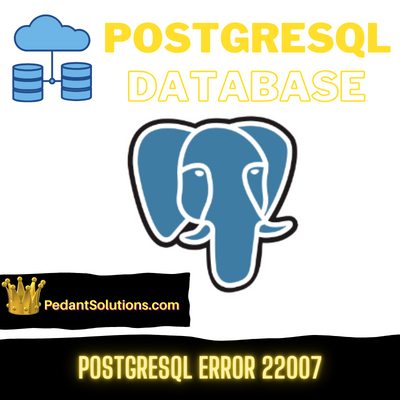PostgreSQL, a powerful open-source relational database management system, occasionally throws a curveball in the form of SQL Error 22007. This error code is associated with time zone-related issues, often arising when handling date and time values. In this article, we will explore the common causes behind PostgreSQL SQL Error 22007 and shed light on resolving these temporal challenges.

Common causes of Postgresql sql error 22007
Few of the reasons of Postgresql sql error 22007 are listed below –
Invalid Date or Time Values
One of the primary causes of SQL Error 22007 is attempting to insert or manipulate invalid date or time values. Double-check your queries to ensure that the date and time components adhere to valid ranges.
Example
INSERT INTO events (event_time) VALUES ('2023-02-30 15:00:00');Time Zone Ambiguity
Handling time zones in PostgreSQL requires precision. SQL Error 22007 may occur if there’s ambiguity in your time zone settings or if you’re not accounting for daylight saving time changes.
Example
SELECT * FROM schedule WHERE start_time > '2023-03-12 02:00:00';Truncation of Time Components
If your query involves truncating or rounding time components, ensure that the resulting values remain within the valid range. Truncating beyond available precision may lead to errors.
Example
SELECT EXTRACT(HOUR FROM event_time) FROM events;Using Time Zone Functions Incorrectly
Misusing time zone functions or providing them with inappropriate arguments can cause this error. Review your usage of time zone functions to ensure correctness.
Example
SELECT CURRENT_TIMESTAMP AT TIME ZONE 'PST';Leap Year Challenges
Leap years can introduce complexities in date calculations. Be mindful of potential pitfalls during leap years, especially when working with intervals or date arithmetic.
Example
SELECT * FROM bookings WHERE booking_date > '2024-02-29';Invalid Time Zone Offset Values
Providing invalid or out-of-range time zone offset values can lead to SQL Error 22007. Double-check that your time zone offsets conform to the expected format.
Example
SELECT * FROM logs WHERE log_timestamp > '2023-12-18 12:00:00+14:00';Daylight Saving Time Changes
Daylight saving time changes can impact your queries, especially if you’re not accounting for them. Be aware of transitions and adjust your queries accordingly.
Example
SELECT * FROM appointments WHERE appointment_time > '2023-11-05 01:30:00';Inspite of Postgresql SQL error 22007, here’s a list of some common PostgreSQL error codes, including but not limited to SQL Error 42601:
- SQL Error 42P01 – Undefined Table: This error occurs when a query references a table that does not exist in the database.
- SQL Error 42703 – Undefined Column: Triggered when a query attempts to use a column that is not present in the specified table.
- SQL Error 23505 – Unique Violation: Indicates that an attempt to insert or update a record violates a unique constraint.
- SQL Error 23502 – Not Null Violation: Occurs when an attempt is made to insert a null value into a column that has a NOT NULL constraint.
- SQL Error 42P02 – Undefined Parameter: This error is raised when using a parameter that is not defined in the context of the query.
- SQL Error 22001 – String Data Right Truncation: Signifies that a string or character data is too long for the specified column.
- SQL Error 42701 – Duplicate Column: Triggered when a table is created with duplicate column names.
- SQL Error 25P02 – In Failed SQL Transaction: Indicates a problem with transactions, often caused by trying to execute a query within a failed transaction.
- SQL Error 23000 – Integrity Constraint Violation: This error occurs when a foreign key constraint is violated during an insert or update operation.
- SQL Error 42602 – Invalid Syntax: Similar to SQL Error 42601, this error code is raised when there’s a syntax error in the SQL statement.
- SQL Error 28000 – Invalid Authorization Specification: Signifies authentication issues, such as providing incorrect login credentials.
- SQL Error 57014 – Canceling Statement Due to User Request: Occurs when a user cancels a running query or statement.
- SQL Error 22003 – Numeric Value Out Of Range: Indicates that a numeric value exceeds the valid range for its data type.
- SQL Error 08006 – Connection Failure: Raised when there is a problem establishing or maintaining a database connection.
- SQL Error 42P05 – Duplicate Table: Similar to SQL Error 42701, this error is raised when trying to create a table with a name that already exists.
- SQL Error 42601 – Syntax error: PostgreSQL uses error code 42601 to signify a syntax error within the SQL statement being executed. This error arises when PostgreSQL encounters a statement with a syntax it cannot recognize or correctly parse.
